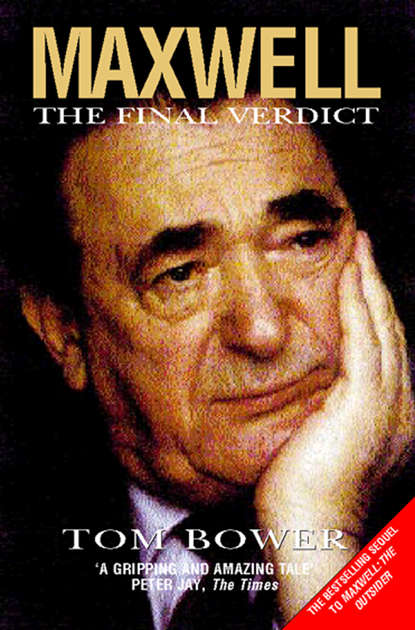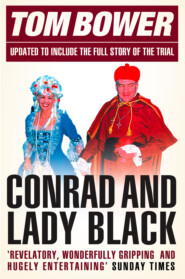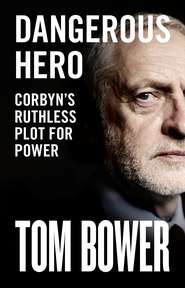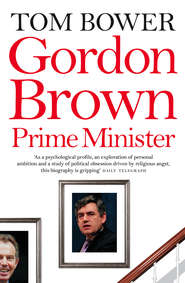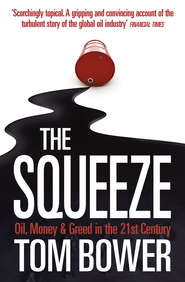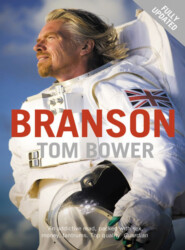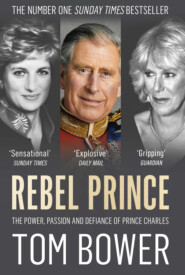По всем вопросам обращайтесь на: info@litportal.ru
(©) 2003-2024.
✖
Maxwell: The Final Verdict
Настройки чтения
Размер шрифта
Высота строк
Поля
Maxwell was uninterested. ‘Yes, yes,’ he smirked condescendingly. ‘Don’t worry. I know my business.’ He would renegotiate later, he reckoned. Getting the newspaper was all that mattered.
By then, gauging precisely how to impress New York, Maxwell had ordered the Lady Ghislaine to speed from Miami and moor on the marina by New York’s 34th Street, not far from the United Nations building. Ranked as he was by Forbes magazine as Britain’s sixth richest citizen personally worth £1.2 billion, his yacht – like his Oxford mansion – confirmed that Maxwell ‘lived like a king with kings’. In this floating headquarters, Maxwell dreamt of entertaining the emperors of America’s media: men like Steve Ross, Larry Tisch and Ochs Sulzberger. In the event his first guest on board was Jim Hoge, the News’s publisher and president. ‘I am going to buy your newspaper,’ boomed Maxwell standing in stockinged feet to protect the thick-pile white carpet. ‘A whore’s rug,’ mused Hoge, who was nevertheless, like even the most hard-boiled New Yorkers, impressed by the vessel. ‘Maxwell’s walk-out didn’t work,’ he later observed. The Publisher would do anything to get the paper. The unions knew that he wouldn’t walk away.
On Monday morning, 11 March, the day of his self-imposed deadline, Maxwell sat across the negotiating table from Steve Ratner of Lazards, who had vouched to the Tribune company for his probity after consulting Bob Pirie of Rothschilds. In the Publisher’s absence they had been negotiating the Tribune’s payment to him. Pirie’s demands, made amid paroxysms of emotion, had bounced off Ratner’s array of cold calculations. ‘We want $70 million,’ burbled Pirie. ‘No way. $65 million is final,’ replied Ratner, knowing full well that the Tribune would indeed pay the extra $5 million to clinch a sale. Maxwell agreed to extend the deadline. Two days later, despite his passionate rhetoric, Pirie surrendered. Maxwell always demanded sycophants as advisers, and Pirie, keen to remain on the gravy train, failed to restrain his client’s own excitement. Ratner and the Tribune executives smiled at Pirie’s failure to get the last $5 million. Fed by his regular walks through the Macmillan lobby, surrounded by eager journalists and waving television cameras, Maxwell became infected by his own prominence and gradually lost the freedom to say the deal was off. The deal with the Tribune was only half the battle. Next, he needed to conclude the employment contracts with the trade unions.
At 11 p.m. on the 13th as Maxwell sat exhausted on the Lady Ghislaine drinking, unusually for him, vodka and orange, McDonald rang. ‘If we don’t sign tonight,’ he said, ‘it’s all off.’
‘Come down,’ said Maxwell, visibly not at his best when McDonald walked shoeless into the state room. For once the Publisher showed no appetite for attempting a last squeeze of the lemon. Thirty minutes later he clinched a deal which supposedly saved $72 million a year on costs. But he lost on critical issues. It was, McDonald would admit, ‘not the best he could have won. Maxwell could have got more concessions. We weren’t hurt as much as we might have been.’
Ratner was less diplomatic: ‘He was so arrogant and unreceptive to advice. He could have got a much better deal if he had driven harder. He lost tens of millions.’
‘We’re in danger of soon making a profit,’ Maxwell said with a smile as he approached waiting newsmen in the lobby of the Daily News building on 42nd Street. His red bowtie glowed incongruously below the plebeian blue Daily News baseball cap, artfully jammed on to his head. In classic Maxwell-speak, he announced a deal which was ‘historical and unprecedented’. Watching from the side as Maxwell basked in the publicity, Hoge understood the new owner’s motives as he stood amid cheering and weeping News employees. Maxwell then led the jubilant, ever growing throng towards the printing presses. The headline was already set. ‘Roll ‘Em!’ screamed his newest acquisition. As, with a great fanfare, he pressed the button to print 1 million copies, the headline was changed to ‘Cap’n Bob bites the Big Apple’. They were genuinely dancing in 42nd Street that night – on the pavements, in the road itself and on the delivery trucks. ‘Let’s see if Murdoch can beat this,’ shouted Maxwell, enraptured by the enthusiasm.
With the cheers still ringing, he was next led along Third Avenue by Pirie to Mr Fu’s, the ‘best Chinese restaurant in town’. As he sat down to spicy fish, John Lindsay, a former city mayor, led the applause for the man who had saved the News.
By daybreak, Maxwell was the news. ‘Brit saves Daily News’, blared a rival’s headline as the Great Saviour allowed himself to be sucked into a rapacious publicity machine. Every television and radio station beamed his voice across the city as he declared his love for New York, just as on earlier occasions he had expressed his love for Holland, Canada, Russia and Israel. Over the following six months, he pledged, he would remain as a ‘hands-on’ publisher. Maxwell, the star, was surrounded by genuine admirers. It was a glorious moment for him.
The previous night, John Campi, the newspaper’s energetic publicity director, had told Maxwell, ‘I want you at nine a.m. at the News stand outside 42nd Street. I’ll collect you from the boat. If you don’t turn up for this, the press will never show up again.’ With unusual punctuality, the Publisher arrived, donned a News hat once again and played to the hundreds who appeared. ‘Go, Maxwell!’ they yelled as autograph hunters thrust newspapers under his nose and women begged to get near the city’s latest hero. ‘I’ve been with celebrities all my life,’ thought Campi, ‘but this is big. He’s the biggest ticket.’
New Yorkers are not easily impressed, yet few remained unswayed by the Briton’s style. Living on board the Lady Ghislaine, Maxwell was repeatedly featured on television news programmes in whatever pose he desired: the mega-tycoon, interrupted by phone calls, receiving a parade of shoeless guests in the splendid state room bedecked with photographs of himself greeting world leaders. As the city bosses paid their respects, he was not averse to comparisons with Randolph Hearst. His presence was felt, and nowhere was it bigger than on his own newspaper’s front page, where – in all seriousness – he declared himself to be ‘a peacemaker’.
Once back inside the News building, the returning strikers discovered that the joviality was strictly confined to the streets outside. Lex Maxwelliana now ruled. Telephone operators were cursed for failing to man the switchboard twenty-four hours a day. Others were cursed for failing to leave their posts and greet their new employer. Among the first to be fired were 130 security men, spluttering bewilderment about who would protect the middle management from the ire of the returning strikers. Little did they realize that the managers were the next in line to be fired. The peacemaker’s presence was abruptly imposed: ‘When I call, I require instant service.’ Somewhere from beyond a voice counselled, ‘When Maxwell shouts “jump”, just ask, “how high?”’
‘Bob, you’ve lost the very people who can help you,’ sighed Hoge, who had decided weeks earlier to resign. His employer was oblivious to all but one mantra: ‘I bet Murdoch couldn’t have done this.’ To underline his challenge, Charlie Wilson was ordered to launch a new newspaper in New York, the Racing Times, to compete with Murdoch’s Racing Form. The gambler was going for broke.
Meetings, orders, summonses and declarations poured forth from a man whose task was herculean. Restoring a newspaper’s morale, motivation and style required the energy and leadership which were Maxwell’s forte. This was a rerun of the Daily Mirror in 1984, a challenge which only Maxwell was either sufficiently courageous or foolhardy to undertake. With time and money, he was sure of success. Juggling had always eventually proved profitable.
In the first days the omens were not good. Important writers were still deserting; advertising revenue remained poor; and the value of the Tribune’s shares zoomed up by $1 billion just for having paid Maxwell $65 million to get rid of the problem newspaper.
Only gradually would Maxwell realize that this was not Britain: that his ban on overtime would need to be revoked; that the replacement for the managers would need to be ex-union men; that the newspaper’s distribution was controlled by the Mob; and that, unless he remained in New York, his revolution would dissipate. All that was ignored. For his real desire, as the representative of a new constituency, was recognition.
Throughout the negotiations, Maxwell had known that Hoge was due at the end of that week to attend the celebrated Gridiron dinner at the Capital Hilton in Washington. The hosts were the nation’s top satirists and their guests were the president, senators, judges, bankers and the Great and Good of America. Maxwell wanted to attend that dinner. Indeed, some in the Tribune camp believed that his haste in signing the agreement with the unions was to qualify for the invitation. This he duly did.
The occasion required tails. Having just risked millions which he did not have, Maxwell naturally showed no hesitation in requiring Bob Cole, his spokesman, to be dispatched by Concorde from London with his best suit. Cole would be given a $200 tip. ‘Buy something for your wife,’ said Maxwell with underwhelming generosity.
Having enjoyed the most expensive meal of his life, he revelled in the attention. Never had he featured more in newspapers. He stayed in Washington overnight. The following day, Hoge was invited to a private lunch for about twenty-five at which President Bush was guest of honour alongside Generals Schwarzkopf and Powell, leaders of the victorious US forces in the Gulf war. Maxwell, understanding only too well the power of association and endorsement from American presidents, ensured not only that he was invited but that he was seated next to the president. During that meal, Bush’s face gradually fell as he glumly sat through a monologue about Maxwell’s triumphant peacemaking between Gorbachev, Shamir, Thatcher and other leaders. Oh my God,’ Bush groaned to an aide as he departed. ‘Absolutely terrific!’ cried Maxwell to John Campi on his return to New York.
The extravaganza showed the symptoms of the Last Hurrah. For the next week, Maxwell remained in New York to manage the News. To recover the circulation and demonstrate his skills as the master of promotion, he rented a clipper moored in the Hudson River and invited past advertisers to a grand party serenaded by a band named New York Pops. In response to his own advertisement, ‘We’re Back – Buy Us’, the circulation soared from 300,000 to 700,000, a hopeful sign but still too low a figure to produce profits.
The only interruption to the euphoria was a report from Kevin. Oblivious of the celebrations on 42nd Street, several banks were pressing for more collateral or repayment of debts. Kevin had summoned Basil Brookes, the young finance director of MCC: ‘The private side needs a £75 million loan.’ Brookes, although it was obvious to him that the banks were squeezing, agreed to the temporary transfer. There seemed no reason to refuse. Neil Taberner, the Coopers partner, had raised no problems over the 1991 audit, and the finances appeared sound. By way of further reassurance, Kevin added, ‘We’ve agreed the terms to sell Pergamon.’ The £446 million paid by Elsevier, the Dutch publisher and competitor, was a good price, and the rationale for the sale was convincing. Scientists in the future would not read magazines, but would obtain their data through computers. Pergamon and its books, explained Kevin, represented an adventure past its prime, overtaken by electronic publishing, and MCC was retaining those rights. Brookes agreed, but after reflecting that MCC would lose the prodigious cash flow generated by Pergamon he insisted, ‘We will have to issue a press release warning that MCC’s profits will be down.’ Kevin paused. Profit forecasts were among the icons which his father held sacrosanct. Anything other than ecstatic predictions were inconceivable. But according to stock exchange rules Brookes was right. Kevin telephoned New York. ‘No. Absolutely not,’ shouted Maxwell. The last contact with reality had clearly been lost in the midst of New York’s adulation. But there was no alternative, Kevin decided. Only one method of persuasion could succeed: a personal conversation.
Вы ознакомились с фрагментом книги.
Приобретайте полный текст книги у нашего партнера:
Приобретайте полный текст книги у нашего партнера:





